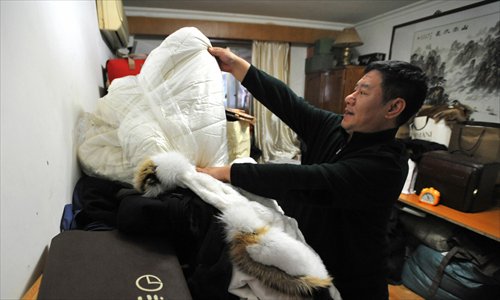HOME >> CHINA, SOUNDSLIDE
Consumer crusaders
By Liang Chen Source:Global Times Published: 2014-3-19 22:28:02

Ji Wanchang, who professionally targets fake or shoddy goods, inspects some products in his office in Jinan, Shandong Province, in March, 2012. Photo: CFP
Liu Dianlin, 60, has been more than delighted since the newly amended consumer rights law took effect on March 15.
"The new amendment of the law will impose a positive influence on safeguarding the rights of the consumers, and lower the cost of providing evidence in court," Liu, who has been fighting against counterfeit and shoddy goods for 18 years, told the Global Times.
Liu became an advocate for consumer rights after he had led a group of 41 households in his residential area who believed the real estate company had cheated them into buying its apartments.
Despite losing the lawsuit, Liu gave up his job and joined the cause of protecting consumer rights.
In China, there are new breeds of special consumers, who are launching small but effective battles to fight against shoddy operators, sellers of counterfeit items and all manner of fraudsters.
They adopt a variety of strategies. Sometimes they buy counterfeit goods in bulk then force the stores to pay compensation for the bogus goods, and lawsuits have become an effective weapon.
Despite the fact their activities have greatly improved people's awareness of consumer rights, their motives are controversial. Some do it for profit, and others even make a living by establishing companies that specialize in these tactics. The fact that the previous law allowed twice the compensation if stores were proved to be selling knockoffs also provided a profit motive, which is set to become even more of a temptation - the new law offers triple the compensation.
New weapon in fight
On Friday, one day before Consumer Rights Day in China, a forum held by consumer rights advocates from all over the country drew huge public attention. A lot of well known consumer crusaders attended the event, which focused heavily on the newly amended consumer law.
"The newly amended law represents progress. It helps reduce the economic burden of providing evidence and makes it easy to launch a lawsuit," He Shan, director of the Chinese Society for the Study of Evidence, told the Legal Mirror.
Previously the consumer rights law had demanded the consumers provide evidence in cases where they sued stores for selling knockoffs. This created a heavy economic burden.
Now, the law has reversed the onus of providing evidence, and stores must prove their innocence.
"The new law still fails to point out whether it applies to consumers who knowingly buy counterfeit goods in order to make a profit via lawsuits," He said.
There has been a lingering dispute over whether people who intentionally buy counterfeit products so they can launch lawsuits should also be able to receive double the compensation. There have been accusations that the practice is little more than blackmail.
In some individual cases, the local courts refused to file a case or rejected consumers' requests for double compensation.
In 2011, Beijing consumer Zhang Ming discovered that a hotel was selling fake Moutai after he tried one bottle. He then bought another 17 bottles of Moutai and sued the hotel for selling bogus goods.
The court in Haidian district, Beijing, turned down Zhang's appeal for double compensation, saying that he had intentionally purchased the goods to gain a profit, and was not an ordinary consumer. Zhang eventually got compensation for the original price of the Moutai.
Compensation conundrum
The increase in the compensation from double to triple has greatly improved the profit margins for consumers who purchase fake goods to make a profit, and has emboldened their efforts.
"Imposing a heavy penalty on stores selling knockoffs will help reduce the quantity of counterfeit and shoddy goods in China," Liu told the Global Times.
Many, like Liu, believe it is good that people can make a profit by exposing shoddy operators. "After all, we have to make a living," Liu said.
Liu has already launched a company to support his activities. Liu's company can help investigate the source of counterfeit or shoddy products, and then hold them to account. He is typically employed by companies in the wine, drug and health food industries, who want to trace people selling copies of their products.
Liu said he hopes the central and local authorities can make companies more transparent and have better company listings so people can properly trace knockoffs.
Wang Hai, a well-known person in China to make use of the 1993 consumer protection law, has organized a team, complete with detectives, to detect and crackdown on fraudsters.
By cooperating with government organs and companies, Wang has developed new ways to target counterfeiters or shoddy manufacturers.
"We cooperate with the China Tobacco Monopoly Bureau and crack down on manufacturers of fake cigarettes. The bureau rewards us with money," Wang said.
Last year, after being hired by a local drug company, Wang was paid 2 million yuan to crack down on outfits producing fake drugs.
Wang said the root cause of the widespread counterfeiting is the fact that consumers don't have a voice.
However, without proper laws to regulate this "profession," consumer rights advocates have caused plenty of controversy. Some of them have taken advantage of the laws in order to blackmail businessmen. In 2011, Liu Jiang, a professional consumer rights advocate from Chengdu, Sichuan Province, was sentenced to seven years in prison over attempts to blackmailing 305 different TV stations. He had reportedly threatened to expose improper advertising on those stations.
Posted in: Society, Soundslide